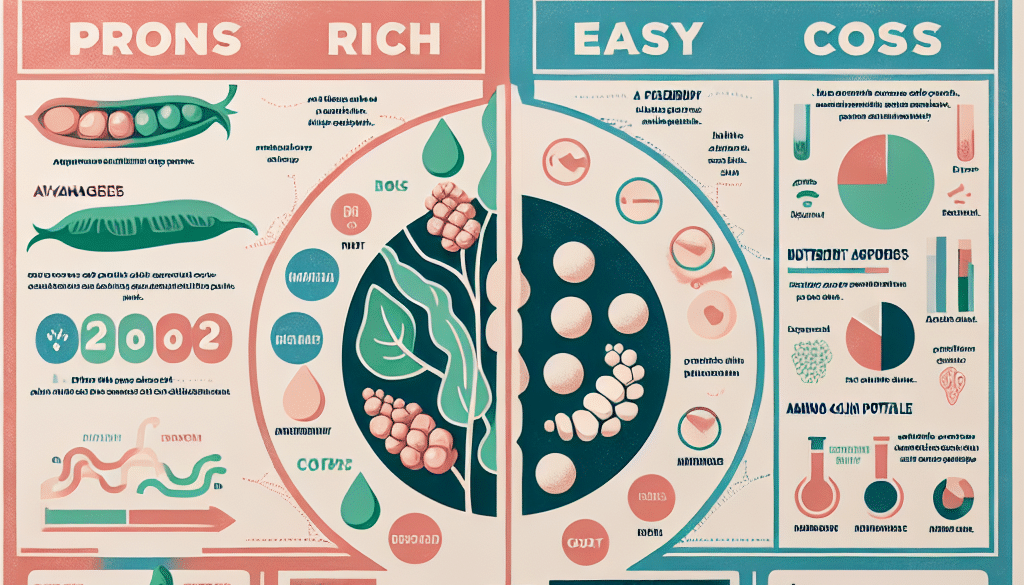Pea Protein Pros and Cons: Balanced View
-
Table of Contents
- Pea Protein Pros and Cons: A Balanced View
- The Pros of Pea Protein
- 1. High Protein Content
- 2. Complete Amino Acid Profile
- 3. Easily Digestible
- 4. Allergen-Free
- 5. Sustainable and Environmentally Friendly
- The Cons of Pea Protein
- 1. Lower in Certain Amino Acids
- 2. Texture and Taste
- 3. Potential Digestive Issues
- 4. Price
- Conclusion
- About ETprotein
Pea Protein Pros and Cons: A Balanced View

Pea protein has gained significant popularity in recent years as a plant-based alternative to traditional animal-based protein sources. Derived from yellow peas, this protein powder offers a range of benefits and drawbacks that are important to consider when incorporating it into your diet. In this article, we will explore the pros and cons of pea protein, providing a balanced view to help you make an informed decision.
The Pros of Pea Protein
1. High Protein Content
Pea protein is known for its high protein content, making it an excellent choice for individuals looking to increase their protein intake. With approximately 20-25 grams of protein per serving, pea protein can help support muscle growth and repair, making it a popular choice among athletes and fitness enthusiasts.
2. Complete Amino Acid Profile
Unlike some other plant-based protein sources, pea protein is considered a complete protein. It contains all nine essential amino acids that the body cannot produce on its own, making it a valuable source of nutrition. This is particularly important for individuals following a vegetarian or vegan diet, as it can be challenging to obtain all essential amino acids solely from plant-based sources.
3. Easily Digestible
Pea protein is highly digestible, which means that it is easily broken down and absorbed by the body. This is beneficial for individuals with digestive issues or those who struggle to digest other types of protein, such as whey or soy. The digestibility of pea protein also makes it a suitable option for individuals with food sensitivities or allergies.
4. Allergen-Free
One of the significant advantages of pea protein is that it is free from common allergens such as dairy, gluten, and soy. This makes it an excellent choice for individuals with food allergies or intolerances. Pea protein is also hypoallergenic, meaning it is less likely to cause an allergic reaction compared to other protein sources.
5. Sustainable and Environmentally Friendly
Pea protein is considered a sustainable and environmentally friendly protein source. Peas require less water and produce fewer greenhouse gas emissions compared to animal-based protein sources like beef or dairy. Choosing pea protein over animal-based proteins can help reduce your carbon footprint and contribute to a more sustainable food system.
The Cons of Pea Protein
1. Lower in Certain Amino Acids
While pea protein is a complete protein, it is lower in certain amino acids compared to animal-based proteins like whey. For example, it is relatively low in methionine, an essential amino acid that plays a crucial role in various bodily functions. However, this can be easily addressed by combining pea protein with other plant-based protein sources that are higher in methionine, such as rice protein.
2. Texture and Taste
Some individuals may find the texture and taste of pea protein less appealing compared to other protein powders. Pea protein can have a slightly gritty texture, which may not be desirable for everyone. Additionally, it has a distinct earthy flavor that may not suit everyone’s palate. However, many brands now offer flavored pea protein options to improve the taste.
3. Potential Digestive Issues
While pea protein is generally well-tolerated, some individuals may experience digestive issues such as bloating, gas, or stomach discomfort. This is more likely to occur if you consume large amounts of pea protein or if you have a sensitive digestive system. Starting with a smaller serving size and gradually increasing it can help minimize these potential side effects.
4. Price
Compared to other protein powders, pea protein can be relatively more expensive. This is partly due to the processing required to extract protein from peas. However, the price may vary depending on the brand and the quality of the product. It is essential to consider your budget when choosing pea protein as a protein source.
Conclusion
Pea protein offers numerous benefits as a plant-based protein source, including its high protein content, complete amino acid profile, and easy digestibility. It is also allergen-free and environmentally friendly. However, it is important to consider the potential drawbacks, such as its lower content of certain amino acids, texture and taste, potential digestive issues, and price. By weighing the pros and cons, you can determine if pea protein is the right choice for your dietary needs and preferences.
About ETprotein
ETprotein, a reputable protein Chinese factory manufacturer and supplier, is renowned for producing, stocking, exporting, and delivering the highest quality organic bulk vegan protein and plant proteins. They include Organic rice protein, clear rice protein, pea protein, clear pea protein, pumpkin seed protein, sunflower seed protein, mung bean protein, etc. Our offerings, characterized by a neutral taste, non-GMO, allergen-free attributes, cater to a diverse range of industries. We serve nutraceutical, pharmaceutical, cosmeceutical, veterinary, as well as food and beverage finished product distributors, traders, and manufacturers across Europe, USA, Canada, Australia, Thailand, Japan, Korea, Brazil, and Chile, among others.
Our specialization includes exporting and delivering tailor-made protein powder and finished nutritional supplements. Our extensive product range covers sectors like Food and Beverage, Sports Nutrition, Weight Management, Dietary Supplements, Health and Wellness Products, and Infant Formula, ensuring comprehensive solutions to meet all your protein needs.
As a trusted company by leading global food and beverage brands and Fortune 500 companies, ETprotein reinforces China’s reputation in the global arena. For more information or to sample our products, please contact us and email sales(at)ETprotein.com today.














